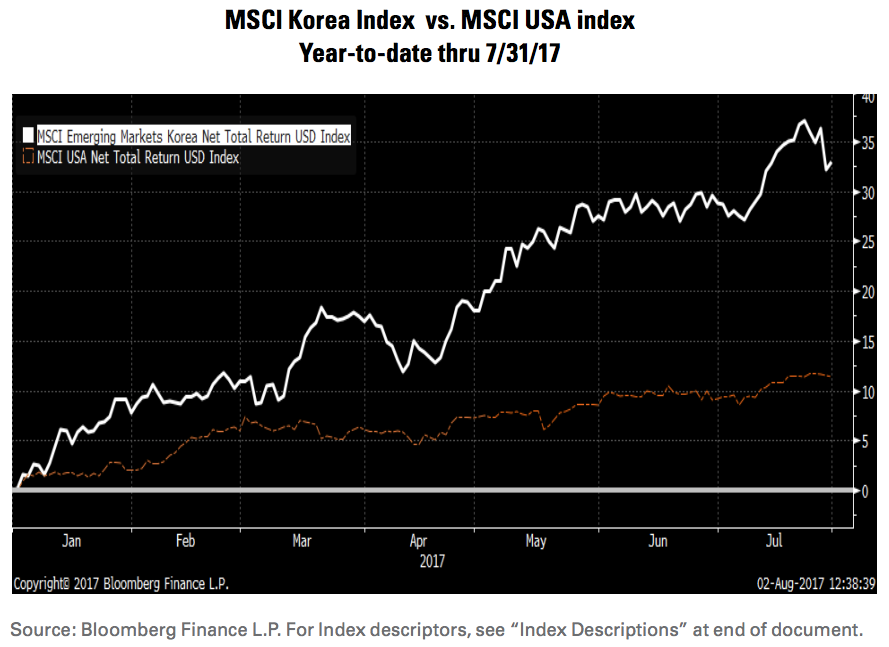Why financial markets aren't panicking about North Korea
World financial markets don’t seem to be worried about war breaking out on the Korean Peninsula any time soon.
On Tuesday, President Donald Trump said North Korea would feel “fire and fury like the world has never seen” should the hermit kingdom continue to threaten the US. This aggressive tone sparked worries among commentators and geopolitical risk analysts, some of whom warned that this could force a violent response from North Korea and its leader, Kim Jong Un.
Following the news, South Korea’s Kospi index fell 1.1% and its won currency fell 0.9% against the dollar. US stock markets were down less than half of 1% in early trading on Wednesday. These moves aren’t anything out of the ordinary.

Complacency has been a profitable trade for decades
Historically, financial markets haven’t exhibited any extraordinary volatility in response to provocations from North Korea. Market experts point to the country’s very long history of not delivering on its threats.
“For decades, complacency has been the ‘right trade’ when it comes to North Korea,” Goldman Sachs analysts said on Wednesday. “More often than not, market participants have been rewarded for fading negative price moves rather than hedging them. Our sense is that investors have grown comfortable with the view that geopolitical tensions invariably result in diplomatic talks, in which case the right trade is to buy any dips. The result is a market psychology that is relatively resistant to the pricing of geopolitical risk.”
RBA’s Rich Bernstein has been writing about this for months, noting that investors have been ignoring the recent geopolitical posturing while betting on the prospects for the economy.
“[T]he South Korean stock market has year-to-date roughly tripled the performance of the US market, and is up more than 30% in USD terms,” Bernstein observed on Monday. “Importantly, that outperformance comes despite the geopolitical risks posed by North Korea. Politicians have focused on North Korea, but it’s been beneficial for investors to focus on South Korea’s improving fundamentals.”

So, it seems investors and traders are taking their cues from the past and betting that the near future will be no different.
Is this time different?
“If tensions between the US and North Korea escalate further, we think that the implications for equities in South Korea and elsewhere will remain limited provided that war does not actually break out,” Capital Economics’ Jessica Hinds said.
To reiterate Hinds’ caveat, things should be fine “provided that war does not actually break out.”
But will this be the time that North Korea actually delivers on its threats? Will this time be different? Has anything really changed?
One thing that has certainly changed is North Korea’s weapons technology. A recent report from the Pentagon concluded that North Korea will be able to launch a nuclear-equipped intercontinental ballistic missile (ICBM) as soon as next year.
Combine that with the saber-rattling and then you might have the ingredients for some costly problems.
“The stock market, which was breezing through the summer, finally has something serious to worry about,” Horizon Investments’ Greg Valliere said. “At the least, there will be headline risks as the bombast ramps up. Just the threat of war could begin to weigh on consumer and business confidence – and spending.”
So as always, investors should be prudent.
“The safest bet is that an uneasy stalemate will persist, with the threat of war eventually subsiding,” Valliere said. “But that is not a certain bet.”
–
Sam Ro is managing editor at Yahoo Finance.
Read more: